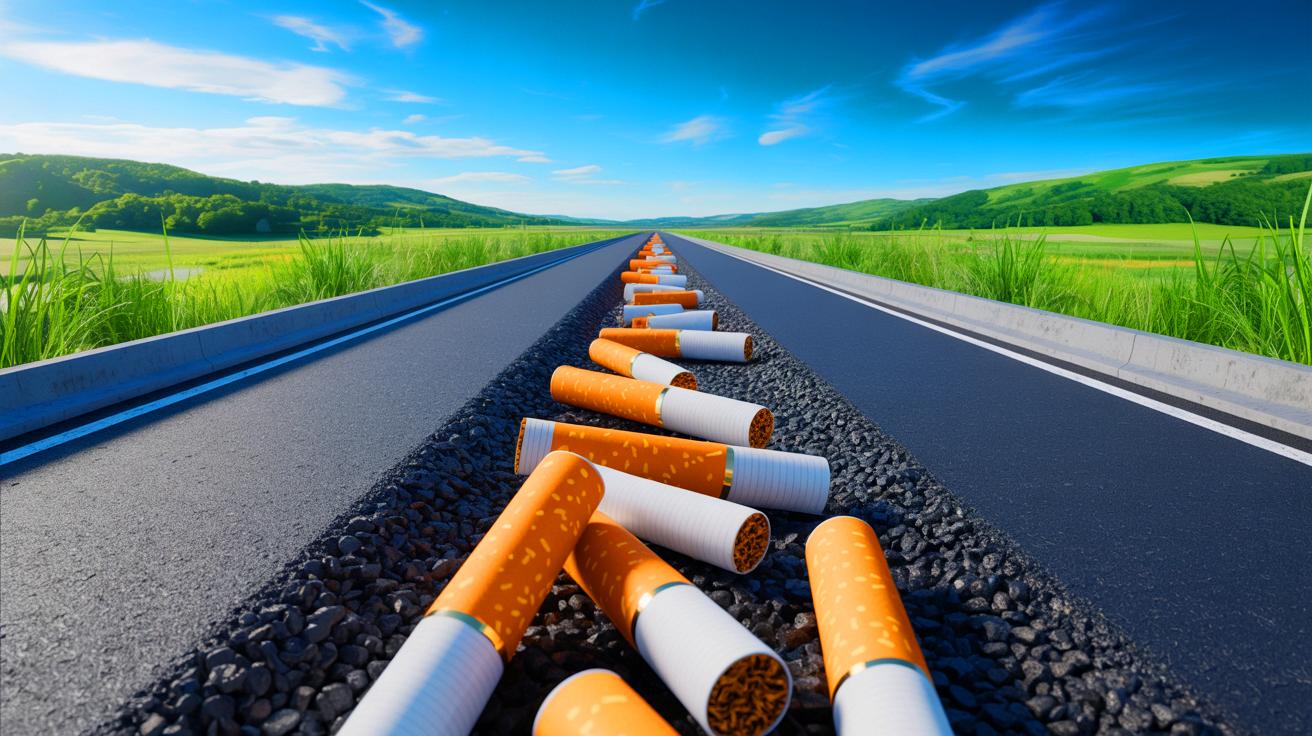
An Unconventional Approach to Sustainable Infrastructure
The push for sustainable development has led scientists and industry leaders to explore innovative ways to repurpose waste materials. One of the most controversial yet promising initiatives involves transforming cigarette waste, particularly cigarette butts, into valuable components of road construction. This approach claims to address two significant environmental problems simultaneously: cigarette waste pollution and the demand for durable, eco-friendly asphalt. However, despite initial enthusiasm, many have raised concerns about the safety, environmental impact, and ethical considerations surrounding this practice. This article explores the multifaceted debate, the scientific advancements behind this technology, and the potential implications for future infrastructure projects.
The Rise of Cigarette Waste Recycling in Infrastructure
Cigarette butts are among the most commonly discarded items worldwide, with billions littered daily, polluting land and waterways. Traditional disposal methods have proven inadequate, leading scientists to seek alternative solutions. In recent years, research has demonstrated that cigarette filters contain a complex mix of plastics, chemicals, and toxins, such as nicotine and heavy metals, which pose ecological hazards. Yet, paradoxically, these very attributes are being harnessed to enhance asphalt properties, turning a pollutant into a resource.
Industry giants and some progressive governments have begun backing initiatives to incorporate cigarette waste into road materials. The rationale is simple: repurposing waste reduces litter, minimizes environmental contamination, and potentially produces more resilient roads. Several studies and projects suggest that processed cigarette butts can act as reinforcement fibers, imparting durability and strength to asphalt mixes.
Scientific Innovations: Turning Toxic Waste into a Construction Asset
Significant scientific research has underpinned this innovative approach. For example, a recent study published by *ETV Bharat* revealed that cigarette butts, when processed correctly, can improve the mechanical properties of asphalt, making roads more resistant to wear and tear. The tiny fibers inside filters, once embedded into asphalt, can act as a reinforcement, preventing cracks and extending the lifespan of road surfaces.
Moreover, researchers have developed methods to safely extract harmful chemicals from cigarette waste before incorporation, thus minimizing environmental risks. The process involves treating cigarette filters to neutralize toxins and blend them with traditional asphalt components. As a result, the modified asphalt demonstrates increased durability, resistance to water damage, and the ability to withstand greater traffic loads.
Notable Scientific Findings Include:
- Durability: Studies show that roads built with cigarette waste-infused asphalt are more durable and less prone to cracking.
- Sustainability: Processing cigarette butts into asphalt reduces environmental litter and pollution.
- Cost-efficiency: Recycling waste materials into construction material can lower overall project costs.
Public and Industry Backlash: Ethical and Safety Concerns
Despite promising scientific results, this initiative has not gone unchallenged. Critics argue that turning toxic cigarette waste into road materials could pose unforeseen health hazards. The presence of residual chemicals, even after processing, raises questions about long-term environmental impacts, including leaching into soil and waterways.
Environmental Safety remains a primary concern. The chemicals in cigarette filters, such as nicotine and heavy metals, are known for their toxicity. If not properly neutralized, these substances may leach over time, especially as roads age and degrade. Environmental watchdog groups warn that this could lead to contamination of local ecosystems, affecting plant, animal, and human health.
In addition to environmental risks, many communities and environmental activists have criticized the ethical aspects of propagating an idea that seemingly trivializes cigarette pollution by turning waste into a commodity. They argue that promoting cigarette waste as an asphalt additive may inadvertently endorse smoking or undermine efforts to reduce cigarette litter altogether.
Concerns Raised Include:
- Health Risks: Potential exposure to residual toxins during processing or from leaching in the environment.
- Environmental Impact: Long-term effects of chemical leaching from treated cigarette waste in road materials.
- Ethical Dilemmas: Using waste from a harmful industry as a resource could be seen as endorsing the continuation of cigarette consumption.
The Industry’s Role and Industry Giants’ Support
In a surprising turn, several industry giants and government agencies have expressed support for the use of cigarette waste in road construction. They argue that this innovative recycling method offers a sustainable, cost-effective solution to manage cigarette litter while improving infrastructure resilience.
The backing by industry figures lends credibility to the science but also stokes contention. Critics worry that such support may overshadow environmental safety considerations in favor of economic gains. The debate centers on whether the potential long-term risks are adequately addressed and transparently communicated to the public.
Future Prospects and the Path Forward
While this controversial initiative has garnered both praise and criticism, it undoubtedly signals a shift toward more inventive, if contentious, environmental solutions. Researchers continue to refine processing techniques to ensure safety and environmental compatibility, and pilot projects are underway in various regions.
Public awareness campaigns and stricter regulatory frameworks could determine whether these practices gain mainstream acceptance or remain experimental. The core question remains: Is the recycling of cigarette waste into road materials a sustainable breakthrough or an environmental gamble? Only time and further research will provide definitive answers.
Conclusion
The use of cigarette waste in road construction embodies the complex intersection of innovation, environmental sustainability, and ethical responsibility. While scientific advancements show promising results in strengthening asphalt and reducing litter, concerns about safety and environmental impact continue to challenge its adoption. As society grapples with waste management and infrastructure challenges, such unconventional solutions highlight the importance of rigorous testing, transparent dialogue, and cautious implementation.
In summary: The journey toward sustainable and innovative infrastructure solutions is fraught with both opportunities and risks. Turning cigarette waste into a construction resource exemplifies how scientific ingenuity can potentially address multiple issues, but it must be balanced with mindful consideration of public health and ecological integrity.
For more updated news please keep visiting Prime News World.








